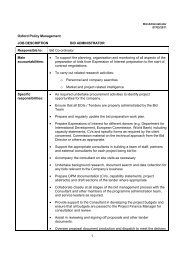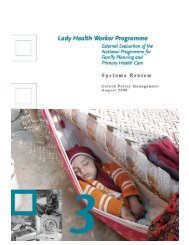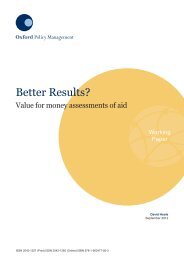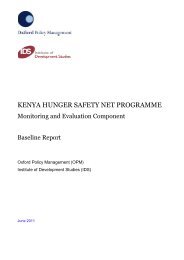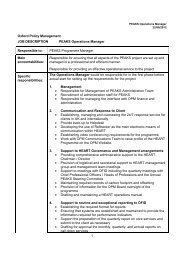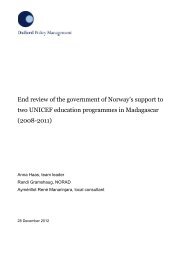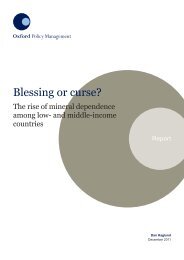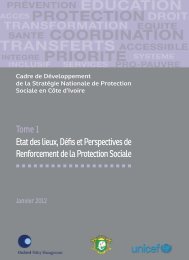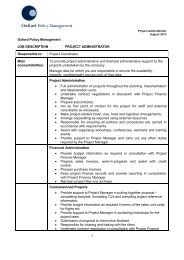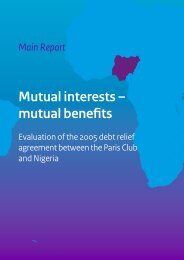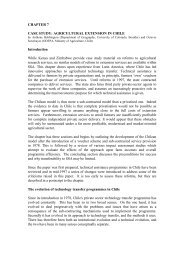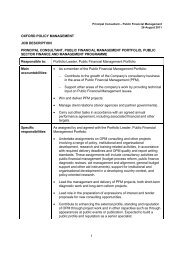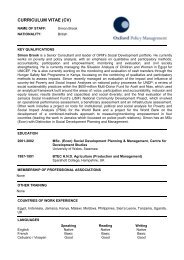LHW Management Review - Oxford Policy Management
LHW Management Review - Oxford Policy Management
LHW Management Review - Oxford Policy Management
You also want an ePaper? Increase the reach of your titles
YUMPU automatically turns print PDFs into web optimized ePapers that Google loves.
<strong>LHW</strong>P – <strong>Management</strong> <strong>Review</strong><br />
Supervisors need to be mobile, either by having access to operational vehicles with drivers<br />
and POL, or by having sufficient travel allowance and access to other forms of transport.<br />
The budget had provision for initiating developments in Phase 2 through one budget for<br />
research and a further budget for relationships with NGOs. These budgets were not utilised.<br />
The conclusion from the financial analysis is that the cost structure of the PC-1, if<br />
implemented, would have resulted in <strong>LHW</strong>s who had the resources required to provide<br />
services, adequate supervision levels, and stronger management and monitoring to allow for<br />
higher delivery of services and the implementation of Phase 2 of the PC-1.<br />
3.8 Governance failure to drive programme strategy<br />
Any organisation has limits on the amount of management attention available. In a<br />
bureaucracy working in a challenging environment, such as rural Pakistan, this attention is<br />
quickly absorbed by day-to-day operations. This is also the case with the Programme. The<br />
governance arrangements of the Programme are there to allow management (both internal<br />
and within the Ministry and Departments of Health) to provide leadership, and to make and<br />
implement the necessary strategic decisions. That they have generally failed to do so<br />
became evident as we addressed the seven questions of the management review. Some of<br />
the issues that were not addressed are: options for decentralisation, non-compliance with<br />
residency criteria in Sindh, issues of integration with basic health units that have been<br />
contracted out to non-governmental organisations, and further expansion in urban areas at<br />
the expense of development of the Programme into poorer rural areas. These issues need to<br />
be exposed by the National Coordinator of the Programme, resolved through the<br />
governance committees, and decisions must be taken to resolve the issues by the Secretary<br />
of Health and the central agencies.<br />
3.9 <strong>Management</strong> failure to implement Phase 2 of the PC-1<br />
Where the Programme management has failed is in moving from Phase 1 to Phase 2, as<br />
defined in the PC-1. Phase 1 (mid-2003 to mid-2005) was to be a time of consolidation and<br />
expansion; Phase 2 (mid-2005 to mid-2008) was to develop a sustainable programme.<br />
By the end of Phase 1, there were to be 100,000 fully trained <strong>LHW</strong>s and 4,000 LHSs.<br />
Systems and procedures for training, implementation, monitoring and supervision were all to<br />
have been improved.<br />
By the end of Phase 2, a capacity-building process at the provincial and district levels were<br />
to have been conducted, along with the trialling of different models for the development of a<br />
sustainable and viable structure for the <strong>LHW</strong>P. This included exploring, through pilots, the<br />
transfer of management functions to the provinces and districts. This did not happen.<br />
The Programme has also failed to implement a number of initiatives and systems<br />
developments outlined in the PC-1 and the Strategic Plan:<br />
• The external evaluation planned for 2005 did not occur, although there was an<br />
internal assessment conducted in 2007 and an external evaluation in 2008;<br />
• While there was expansion, 50 percent of the expansion occurred in only 15 districts;<br />
• The Programme did not consistently stop recruitment in urban areas;<br />
• While there was expansion into poorer areas, the incentive remained to increase<br />
<strong>LHW</strong>s at health facilities where the Programme was already established;<br />
• A mechanism was established to explore options for decentralization, but it was<br />
never utilized. The Inter-Provincial Committee for Decentralization never met:<br />
12



